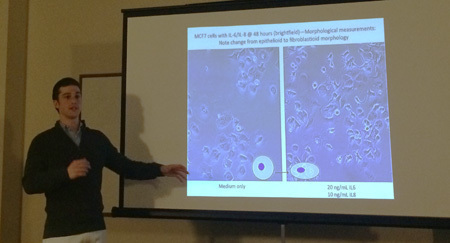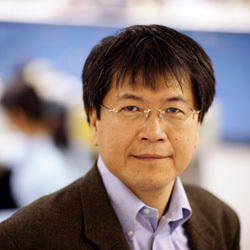The students from Scientia, the undergraduate journal of scientific research, host a monthly seminar series called Talk Science that highlights the work of undergraduate and faculty researchers at the University. This semester, Talk Science will focus on research that can be applied in innovative ways. This month’s presenters were junior biological sciences major Vincent Riccelli and Hsueh-Chia Chang, professor of chemical and biomolecular engineering.

The first presentation, “Tumor-Associated Macrophages and Epithelial-to-Mesenchymal Transition (EMT) in Primary Breast Cancer,” showcased Riccelli’s summer research at the Hillman Cancer Center in the University of Pittsburgh Cancer Institute under the advisement of Vera S. Donnenberg and Albert D. Donnenberg. Over the last two summers, his research focused on tumor stem-like cells that have been linked to tumor metastasis and epithelial-to-mesenchymal transition (EMT) at the invasive front of primary breast cancer. It has been proposed that these cells interact with tumor-associated macrophages to induce EMT in invasive adenocarcinoma.
“I came into the experience knowing little to nothing about cancer biology. I prepared by reading several of Dr. Donnenberg’s earlier publications, asking questions, and listening attentively at lab meetings. I enjoyed working there so much that I returned to work full-time in the lab last summer,” said Riccelli.

The presentation, “Next-Generation Medical Diagnostics,” focused on Chang’s work to develop patented devices for technology transfer. Chang, who is also the Chief Scientific Advisor at FCubed, LLC explained how his research focuses on exploring and applying electrokinetic phenomena to develop new diagnostic and micro/nanofluidic devices that are portable, sensitive and fast. FCubed is particularly interested in designing new molecular sensing and analysis technologies based on AC and non-equilibrium electrokinetics at the surface of nanoporous membranes and nanostructure assemblies.
Chang currently has eight Notre Dame patents, two of which are licensed through FCubed. Devices and techniques under development include DNA/RNA sensing, on-chip pH actuation, Carbon Nanotube/Nanocolloid molecular sensors, nanofluidic diodes, plasmonic sensors etc.
“We always organize research in a certain direction, anticipating the needs of what society will need in the future. It’s a guided effort and not something that’s totally random; there’s always a goal at the end,” said Chang.
Talk Science provides a fun, informal, and stimulating environment for all undergraduates to keep up with research from Notre Dame’s scientific community. All undergraduates with an interest in science, engineering, or research are invited to Scientia’s next Talk Science seminar on Thursday, March 19 at 7 p.m. in the Jordan Hall of Science Reading Room. Questions about Scientia or Talk Science can be directed to Katrina Magno or Orrin Belden at scientia@nd.edu
Originally published by at science.nd.edu on February 20, 2015.
